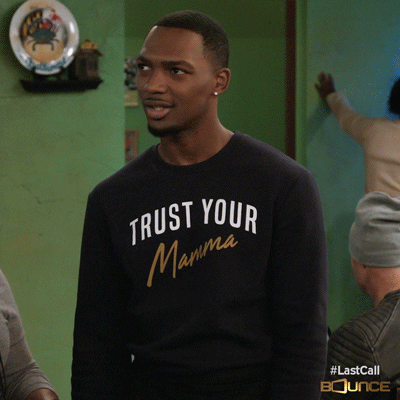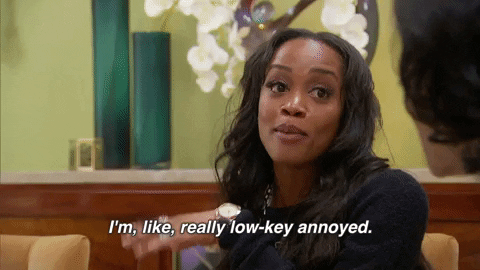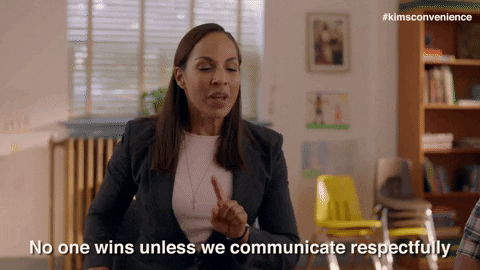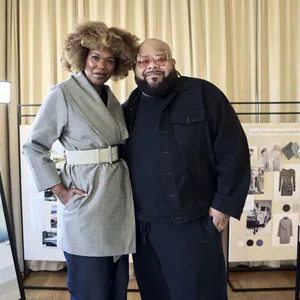Something that I make a point to tell every engaged couple that I come into contact with is, "Make sure you have sex on your wedding night." There are a billion reasons why I think it is so important. For starters, in this context, consummate literally means "to complete (the union of a marriage) by the first marital sexual intercourse". This means that the marriage vows don't "complete" your wedding day; having sex with your spouse does. Also, if you can prioritize cake eating and picture taking, you can make sure to get it in (what matters, we make time for…right?). Another reason why I think it's a big deal is because it's really unfortunate—and a little shocking—how many couples don't copulate on their wedding night. How many? According to one pretty popular study, a whopping 52 percent!
What I find to be even more interesting than that is some of the same reasons why newlywed couples don't do-the-do on their first night as husband and wife are the same reasons why a lot of people (some studies say 20 percent) are in a sexless marriage—fatigue, poor communication, fighting (couples who fight on their honeymoon are more likely to fight throughout their marriage, by the way), stress, side effects from medication, not factoring in your partner's needs and even kids (some people are with their children on their wedding night and/or end up not taking a honeymoon).
And what technically makes a marriage sexless? If you and yours are only having sex 10-15 times a year, although I hate to break it to ya, that places you firmly into the category. The reason why that's not something to simply shrug off is, aside from physical issues that would prevent you from having sex, there is not one sane therapist, counselor or coach would will tell you that a marriage without sex is healthy.
Sex is a responsibility in marriage (check out "10 Wonderful Reasons Why Consistent Sex In Marriage Is So Important"). Even the Bible says, "Do not deprive one another except with consent for a time, that you may give yourselves to fasting and prayer; and come together again so that Satan does not tempt you because of your lack of self-control." (I Corinthians 7:5—NKJV) Did you catch that? A marriage without sex in it is a form of deprivation.
But what if you already are in a sexless marriage? What should you do? Although it takes a while to restore a sexless union, here are some questions that can help you and yours to get back on track.
Whose Definition of “Sexless” Is It?

One time I was working with a married couple on improving their intimacy outside of the bedroom. As I was offering up some tips, the husband said, "It's gonna be hard for me to focus on that when we're damn near in a sexless marriage." The wife immediately sighed. Although we were on a phone session, I had worked with them long enough that I knew she was rolling her eyes. "How often do the two of you have sex?" I asked. Before the husband could answer, the wife said, "Three times a week." Wow. And that is what her husband considered to be sexless. Bless his heart.
Listen y'all, when it comes to sex, there is a big amount of space in between deprivation and straight-up greediness. Again, the official definition of a sexless marriage is couples who engage no more than around once a month. If you are getting more than that, while you and your spouse may be sexually incompatible when it comes to appetites, or you may need to come to a place of compromise regarding frequency, a sexless marriage, you two are not in.
So, if you are like this husband (because a lot of wives have stronger libidos than their husbands do) and you are telling yourself that your marriage is sexless simply because it doesn't happen as much as you'd like, make sure to get honest about the narrative. Not having sex as much as you'd like is nothing like a sexless marriage. Any couple in a sexless marriage will tell you that.
How Long Has This Been the Case?

If indeed you have narrowed down that it's been so long since you've had sex that you can't remember the last time that it actually happened (which is way too long), it's now time to reflect on how long "long" has been. Do the two of you have a pretty healthy sex life (for the most part) and it's only been a couple of months of MIA TLC, or is there more of a pattern going on?
There's one couple I know who are physically capable of having sex and claim that their marriage is fine. But guess how long it's been since they've had sex? Around three years. More than that if you count good sex. If there's one thing that is supposed to make a married couple's relationship different than all of the other ones that they have, it's the fact that they actually have sex with their husband or wife. If you're not making physical intimacy a priority in your marriage, why is that? No…really…why is that? It's not "just because". And whatever the real reason is? It's gonna reveal what's really going on in your relationship. Chances are, sex has very little to do with it too.
What Was Intimacy Like Prior to Marriage?

Something that can be a total set-up is thinking that sex, when you're married, isn't much different from sex when you are single. Shoot, you can check out "What 5 Men Had To Say About Married Sex" to see just how off the mark that is. When you're single, a lot of times sex is about gettin' yours—on your schedule and on your terms. But any healthy married person will tell you that sex within a sacred union is about a lot more than climaxing. Selflessness, open communication, and mutual fulfillment are not only meant to be constant considerations but consistent goals as well.
Some people are in a sexless marriage because, although as a single person, sex was "fun" (because it was so much about them and not much else), they now view sex as "work".
If you add to that the fact that their past partners' needs weren't that big of a deal, now that their spouse's needs should be a top priority, they would rather pass on sex than mature into the kind of partner their spouse needs in order for them to have a happy, healthy and thriving sex life.
Single sex doesn't necessarily have to be intimate. Oh, but married sex should be. Are you struggling with emotionally connecting? If so, could that be the cause of your sexless situation?
What Does Your Spouse Have to Say About It?

Here's another sign that your marriage is unhealthy—whenever you bring up the lack of intimacy that's currently in your relationship with your spouse, they give you the Kanye shrug and go back to whatever it is that they were doing. The reason why I say that is because it's pretty rare that if a sexless marriage is going on, both individuals are completely fine with that.
Not to send you down a rabbit hole, but someone I know who is in one once told me that the only reason why I was giving their marriage a side-eye was because "I wasn't mature enough to understand that sex is not all that important, the older a couple gets." Guess what? About six months after they said that, they found out that their spouse had been cheating for at least a year. Before you pin it all on the cheater, how would you feel if it had been a couple of years since you had gotten some? Wouldn't you feel like your spouse had left you out to dry? Even the Bible says that a sexless marriage gives room for evil entities to do their thing.
In an article that I read on sexless marriages, it featured a study that said the coping mechanisms for dealing with this type of issue range from masturbating (79 percent) to having an affair (26 percent). But what really stood out to me is the fact that 51 percent choose to get into a hobby or (catch it) strike up relationships with other people. Hmm. I just read that around half of all emotional affairs eventually turn physical, so yeah, don't assume that just because your spouse is not talking about how they feel about the lack of intimacy and sex in your relationship that they are "fine". According to statistical data, they probably aren't anywhere close to being that.
Have the Two of You EVER Been on the Same Page Sexually?

As far as their intimacy goes, something that some couples share with me, is that it's easier to have less sex when neither of you were on the same page to begin with. If one or both of you were sexually active and not exactly "thrilled" with one another, sometimes you'll tell yourselves that things will get better after saying "I do". Then, if things still aren't quite right, after a couple of years of actually trying to get in sync or faking like you're sexually satisfied when you're really not. After all, faking is lying and when is lying to your partner ever a good idea?
What all of this boils down to is if you're in a sexless marriage because the poor quality has led to low quantity, it's time to get proactive. There are websites like The Marriage Bed that can provide information on just about anything you can think of sexually if you need help sparking up a conversation. It can also be helpful to create a sex vision board (check out "Should a Married Couple Have a Vision for Their Sex Life?") where both of you can share your innermost fantasies and desires. Personally, I am a huge fan of sex jars (you can read more about that here), and a sexcation can never hurt either.
Sometimes, navigating through a sexless marriage is all about perspective. Rather than surrendering to the belief that you are "doomed" to bad sex for the rest of your life, choose instead to see your situation as a lifetime to explore and evolve with your spouse. If both of you are committed to the goal of having a mind-blowing sex life, you're already halfway there.
Are You BOTH Open to Therapy?

In the article "7 Signs a Marriage Won't Last, According to Sex Therapists", I found it interesting that the #1 sign a marriage won't last is that couples no longer have sex. While I personally think that, if two people truly want to, they can overcome any obstacle in marriage, I will say that if you and yours aren't having sex and it's been that way for a while, trying to fix things on your own is probably gonna prove to be futile (because really, if you could, wouldn't you have by now?). The solution? Counseling.
But let me get specific about this. One time a husband told me that during premarital counseling at his church, he spoke very graphically about how important fellatio was to him. Because the people he was speaking with didn't "believe in" oral sex (what in the world?!), they sped past his point. He can count how many times he's gotten head in the almost twenty years of marriage (SMDH).
Where I'm going with all of that is this—if you're already a little hesitant about marriage counseling, make sure that you "interview the counselor" (or therapist or coach) before formally agreeing to become their client. You need someone who you and your spouse can feel totally comfortable with. Not only that but someone who is willing to broach every aspect of your intimacy—and non-intimacy—until the issue is resolved. Squeamish, super-churchy, and sexually pinned-up professionals need not apply. At all.
How “in This Thing” Are You?

"For better or for worse." When folks say that on their wedding day, it's kind of amazing how much they seem to focus on the better and underestimate how low the worst can actually get. A sexless marriage is hard, and to some people, it can even feel like a form of torture, but you really need to ask yourself if it's something to totally throw in the towel over.
One day, when you've got about 30 minutes or so, jot down all of the things that you love about your spouse. Then write down all of the things that disappoint you, including your less-than-stellar sex life. What has more things on its side? If it's the good stuff, isn't that enough of a motivator to stay and work on your marriage?
A marriage without sex totally sucks. I get that. But a relationship that consists of good sex and nothing else isn't much better. You up the chances of the latter being the case for you should you end the union that you are already in. The one you promised to stick with, even when times get hard.
BONUS: There’s No Time Like the Present

I must admit that one of the things that truly baffles me about sexless marriages is there is no time like the present to change the status of that type of situation. I mean, if two people aren't having sex—and again, they are physically able and there is no abuse that is going on—why not…start having it?
If your immediate thought is, "I hear you, Shellie but it's not that simple," then you are proving a point that I already made. Is the problem really about sex or is it something more? Much more?
The fascinating thing about sexless marriages is it forces couples to look at all areas of their relationship. If the act of sex itself is the last thing that you want to initiate in order to remedy your sexless marriage, resign yourself to the fact that there is something much deeper that is going on.
After all, as I oftentimes say, "Sex celebrates love, not creates it." Do you and yours have something to celebrate or not? The answer to that alone can get you down to the root of why you're currently in a sexless marriage.
Want more stories like this? Sign up for our newsletter here and check out the related reads below:
Maintenance Sex Could Be The Key To A Successful Marriage
7 Things Married Couples Do To Damage Their Sex Lives & Don't Even Know It
10 Married Couples Share The Keys To Their Totally Off-The-Chain Sex Life
10 Sex Resolutions Every Married Couple Should Make
Feature image by Getty Images
- 10 Wonderful Reasons Why Consistent Sex In Marriage Is So ... ›
- Ask Ayana Iman: My Husband & I Haven't Had Sex In 5 Years, What ... ›
- Sex After Birth: Having Sex After A Baby - xoNecole: Women's Interest, Love, Wellness, Beauty ›
- How Often Married Couples Have Sex - xoNecole: Women's Interest, Love, Wellness, Beauty ›
- Fear Of Intimacy? Loving Sex But Hating Physical Intimacy - xoNecole: Women's Interest, Love, Wellness, Beauty ›
- What Married Couples Need Sex Life - xoNecole: Women's Interest, Love, Wellness, Beauty ›
- Things Marriage Needs To Survive - xoNecole: Women's Interest, Love, Wellness, Beauty ›
- Americans Are Having Less Sex. Here's How To Avoid Being A Statistic. - xoNecole: Women's Interest, Love, Wellness, Beauty ›
- 6 Signs You're A Sexually Mature Woman - xoNecole: Women's Interest, Love, Wellness, Beauty ›
- Why Writing Love Letters Is A Surefire Way To Revive Your Marriage - xoNecole: Women's Interest, Love, Wellness, Beauty ›
- 7 Ways Couples Can Improve Their Sex Life In the New Year - xoNecole: Lifestyle, Culture, Love, Wellness ›
- Should You Stay in a Sexless Relationship? ›
- When the Cause of a Sexless Relationship Is — Surprise! — the Man ›
- How it feels to live in a sexless marriage – readers respond | Life ... ›
- What To Do If You Have A Sexless Marriage | Betterhelp ›
- Are You in a Sexless Marriage? Ways to Tell and How to Fix it ›
- Sexless relationship advice: how to fix it ›
- Here's What Sex Therapists Want Couples In Sexless Marriages To ... ›
- How to Fix a Sexless Marriage ›
- Can A Sexless Marriage Survive? We Asked The Experts. | HuffPost ... ›
- Are You in a Sexless Marriage? ›



























